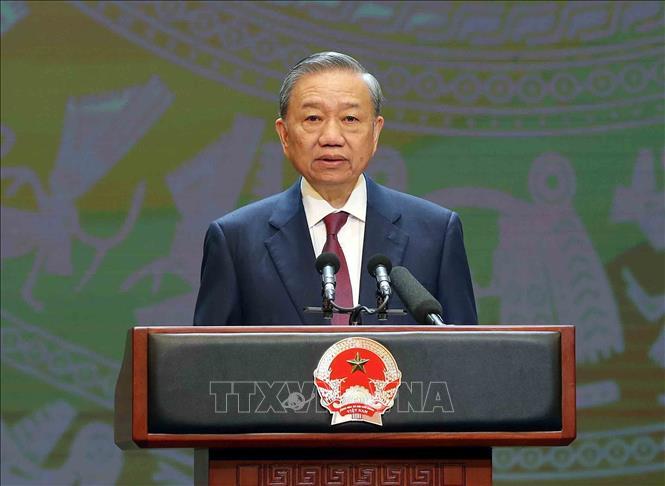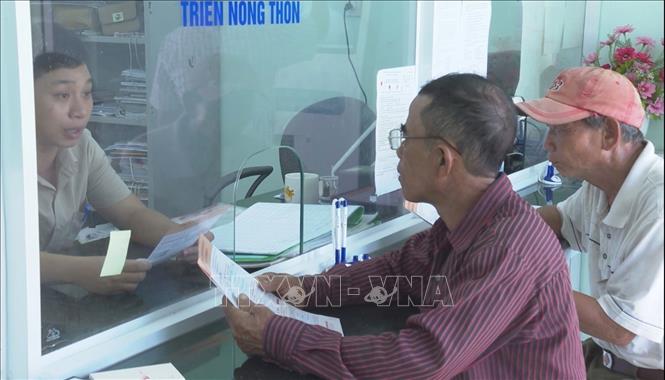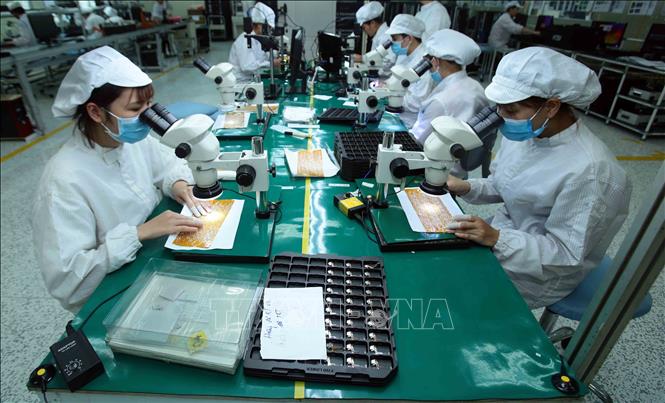1. Immediately after gaining power, our Party deeply recognized the importance of developing productive forces and gradually reforming and perfecting production relations. This process took place through many stages, reflecting the continuous movement and development of the Vietnamese Revolution .
The August Revolution of 1945 opened a new page in the history of the nation's development in the context that the country had just gained independence and had to enter a long-term resistance war. Starting from a backward agricultural background, having gone through thousands of years of feudalism and hundreds of years of colonial rule, our Party implemented the policy of "land to the tillers" to give land to the peasants, abolish the private ownership of means of production, aiming to reform production relations, creating the premise for building a socialist mode of production.
In the period of 1954 - 1975, our revolution simultaneously carried out two strategic tasks, the Socialist Revolution in the North and the People's National Democratic Revolution in the South. In the North, focusing on building the material and technical foundations of socialism, consolidating and perfecting new production relations based on three pillars: public ownership, centralized planning management and distribution according to labor [1], has brought about remarkable development of productive forces.
In 1975, our country was completely unified, opening a new chapter in the construction of socialism. The 4th Party Congress in 1976, based on an assessment of the country's major characteristics, that is, from a widespread economy of small-scale production, it advanced straight to socialism, skipping the stage of capitalist development; set out the policy of firmly upholding the dictatorship of the proletariat, promoting the collective mastery of the working people, determined to carry out three revolutions simultaneously: in production relations, science - technology and ideology and culture [2]. In which, the scientific - technological revolution is the key, promoting industrialization is the central task.
From 1979 to before the 6th Party Congress in 1986, our country experienced serious crises, partly due to the lack of synchronization between productive forces and production relations. Productive forces were held back not only in cases of backward production relations, but also when production relations had elements that went too far compared to the level of development of productive forces [3].
From that correct perception, the 6th Party Congress was determined to carry out comprehensive innovation, focusing on economic innovation, transforming the economic structure, diversifying economic sectors, innovating management mechanisms, eliminating subsidies, and gradually shifting to a socialist-oriented market economy.
Resolution No. 10-NQ/TW dated April 5, 1988 of the Politburo was a breakthrough in innovation of production relations in agriculture when it officially recognized households as autonomous economic units and granted long-term land use rights to farmers, in accordance with the development requirements of the productive forces [4].
After only one year of implementing the Politburo Resolution, Vietnam, from a country with chronic food shortages, produced 21.5 million tons of rice and exported 1.2 million tons of rice for the first time. The appropriate adjustment of production relations created new momentum for the development of productive forces, helping the country overcome the crisis and enter a period of comprehensive innovation and international integration.

2. Entering the 21st century, Vietnam has achieved great achievements in socio-economic development. The estimated average GDP growth rate in the 2021-2025 period is 5.7-5.9%/year, among the leading countries in the region and the world; the size of the economy increases 1.45 times, estimated to reach 500 billion USD by 2025.
Per capita income increased sharply from 3,400 USD to about 4,650 USD, bringing Vietnam into the group of upper middle-income countries by 2025. Macroeconomic stability, inflation under control; flexible and effective management policies; increasingly enhanced international position and reputation; economic growth rate maintained at a high level, people's lives significantly improved.
The labor force is estimated to reach 53.2 million people by 2025, with a positive structural shift; the proportion of agricultural laborers has decreased sharply to 25.8%; the quality of human resources has continuously improved with 70% of workers having undergone training. High-quality human resources meeting the requirements of the Fourth Industrial Revolution in key areas such as semiconductor industry, artificial intelligence, and information technology have been focused on development, initially forming a workforce with increasingly improved digital thinking and digital skills.
Artificial Intelligence (AI), Internet of Things (IoT), Big Data and Cloud Computing are gradually becoming important production tools in many industries and fields. Infrastructure, especially digital infrastructure, is being invested in and developed strongly. Telecommunication networks and broadband internet cover the whole country, creating a foundation for the development of the digital economy and digital society.
However, we also face new challenges. The process of globalization and international integration poses an urgent need to improve the competitiveness of the economy. The fourth industrial revolution is taking place strongly, the development of production tools in the digital economy creates profound changes in the productive forces, leading to new contradictions with existing production relations; both creating the premise and driving force for the formation of new production methods in the future, and requiring fundamental changes in the way of organizing production and social management. New productive forces are forming and developing strongly; however, the quality of human resources is still far from the requirements of national development in the new period, while training and fostering to improve the quality of human resources, especially high-tech human resources, remains a big challenge. Production relations still have many shortcomings, not keeping up with the development of productive forces.
In particular, mechanisms, policies and laws are not really consistent, still overlap, and have not created a truly favorable environment to attract resources from domestic and foreign investors as well as from the people; law enforcement and policy enforcement is still a weak link.
The work of arranging and perfecting the organization of the State administrative apparatus to be streamlined, operate effectively and efficiently, reduce focal points and intermediate levels is still inadequate, some parts are still cumbersome, overlapping between the legislative and executive branches, not really meeting the requirements of improving the effectiveness and efficiency of management. Some ministries and branches still take on local tasks, leading to the existence of a mechanism of asking and giving, which easily gives rise to negativity and corruption. The work of streamlining the payroll associated with job positions, improving the quality and restructuring the team of civil servants and public employees is still lacking in thoroughness.

Administrative reform, digital transformation , e-government and digital government construction are still limited. There are still cumbersome and outdated administrative procedures, with many stages and many doors, taking a lot of time and effort from people and businesses, easily giving rise to petty corruption, hindering development. The connection and sharing of data between information systems of ministries, branches, localities and the national database are not smooth; many online public services are of low quality, the user rate is not high; the organization and operation of "one-stop" departments at all levels in many places is not effective.
Based on the theoretical foundation of Marxism-Leninism, we clearly perceive that, in the relationship between productive forces and production relations, productive forces play a decisive role in the development of production relations, and production relations must be constantly adjusted to suit the increasingly high level of productive forces. When production relations do not keep up with the development of productive forces, they will become an obstacle, hindering the progressive development of the entire mode of production, thereby affecting the overall development of the country.
3. We are facing the need for a revolution with strong and comprehensive reforms to adjust production relations, creating new momentum for development. That is the digital transformation revolution, applying science and technology to restructure production relations in line with the remarkable progress of productive forces. Digital transformation is not simply the application of digital technology to socio-economic activities, but also the process of establishing a new, advanced and modern mode of production - "digital mode of production", in which the characteristic of productive forces is the harmonious combination of humans and artificial intelligence; data becomes a resource, an important means of production; at the same time, production relations also have profound changes, especially in the form of ownership and distribution of digital means of production.
Changes in production relations will strongly impact the superstructure, open up new methods of social governance, create new tools in state management, and fundamentally change the way the state and citizens interact, and between social classes. The digital transformation process needs to be carried out comprehensively and synchronously, taking into account the dialectical relationship between infrastructure and superstructure, in order to build a socialist-oriented market economy, both promoting the strength of modern productive forces and ensuring the good nature of the socialist regime, in accordance with the specific conditions of Vietnam in the new era. To do so, leaders of Party committees, authorities, agencies, enterprises and people must be fully aware, unified, responsible and determined to carry out the digital transformation process; at the same time, it is necessary to focus on implementing a number of key tasks, as follows:
Firstly, perfecting institutions and the legal system, firmly pursuing the goal of building a socialist-oriented market economy, and constantly innovating to keep up with the development trends of the times. Focusing on building a legal corridor for the digital economy, creating a foundation for Vietnam to seize opportunities from the Fourth Industrial Revolution. Having strong mechanisms and policies to promote digital transformation in all socio-economic fields, encouraging innovation, and protecting intellectual property rights.
Regularly review and promptly amend inappropriate regulations, creating a corridor for new economic models such as sharing economy, circular economy, artificial intelligence... ensuring that the legal framework does not become a barrier to development, while ensuring national security, protecting the rights and legitimate interests of people and businesses.
Second, unleash and maximize all social resources, accelerate modernization. Have appropriate mechanisms and policies to mobilize the enormous resources of the people, businesses and economic sectors; resources from land and assets in society that people are accumulating, turn these potentials into driving forces and means of production, to produce more material wealth for society.
Create an open and transparent investment environment, strongly attracting domestic and foreign capital for science and technology development and innovation. Maximize human resources - the decisive factor of innovation. Have a breakthrough mechanism to attract domestic and foreign talents; build a strategy to develop human resources with knowledge, skills and innovative thinking, meeting the requirements of the digital economy and the Fourth Industrial Revolution.
Third, reform and build a streamlined, effective and efficient state apparatus. Cut down unnecessary intermediaries, and reorganize the organization in a multi-sectoral and multi-disciplinary direction. Promote decentralization and delegation of power, combined with increased inspection and supervision, and clearly define responsibilities between the central and local governments, between local authorities, and between managers and workers. Perfect the inspection and supervision mechanism, ensure consistency in state management and promote the initiative and creativity of localities.
Promote the application of information technology, build a digital platform to connect and share data between agencies and organizations. The goal by 2030 is that Vietnam will be among the top 50 countries in the world and ranked 3rd in ASEAN in terms of e-government and digital economy. In the reform process, adhere to the principle of Party leadership, State management, and People's mastery. Streamlining the apparatus must improve the effectiveness of state management, the quality of service to people and businesses, and create a favorable environment for socio-economic development.

Fourth, promoting digital transformation associated with ensuring security and safety is an objective necessity for Vietnam to make a breakthrough in the new era. Focus on building a digital society, comprehensively digitizing state management activities, and providing high-level online public services. Synchronously connecting national databases on population, land, and enterprises, creating a foundation for streamlining the apparatus and reforming administrative procedures substantially. Developing a digital economy creates new momentum for growth; promoting the application of digital technology in all sectors and fields, creating new business models. Developing digital citizens, equipping people with the necessary knowledge and skills to effectively participate in the digital economy and digital society, ensuring that no one is left behind.
Our country is facing a new opportunity, which is both an opportunity and a challenge on the path of development. Under the leadership of the Party, with the consensus and joint efforts of the entire Party, the entire people and the entire political system, we will certainly successfully carry out the digital transformation revolution, creating a breakthrough in developing productive forces and perfecting production relations, bringing our country and our people to a new era, an era of progress, civilization and modernity.
------------------------
[1] Complete Party Documents, Documents of the 3rd National Congress of Delegates, September 1960.
[2] Complete Party Documents, Documents of the 4th National Congress of Delegates, December 1976.
[3] Complete Party Documents, Documents of the 6th National Congress of Delegates, December 1986.
[4] Resolution No. 10-NQ/TW dated April 5, 1988 of the Politburo on innovation in agricultural economic management.








